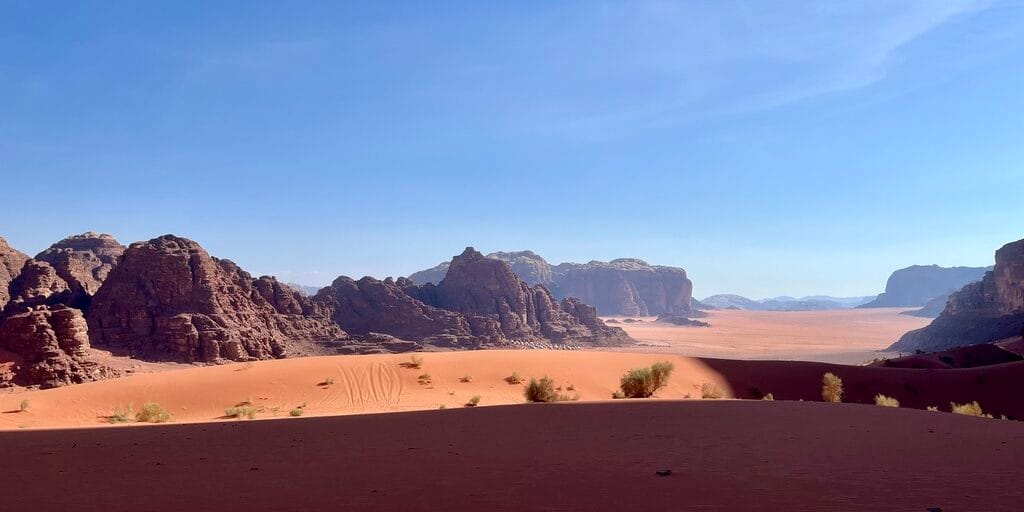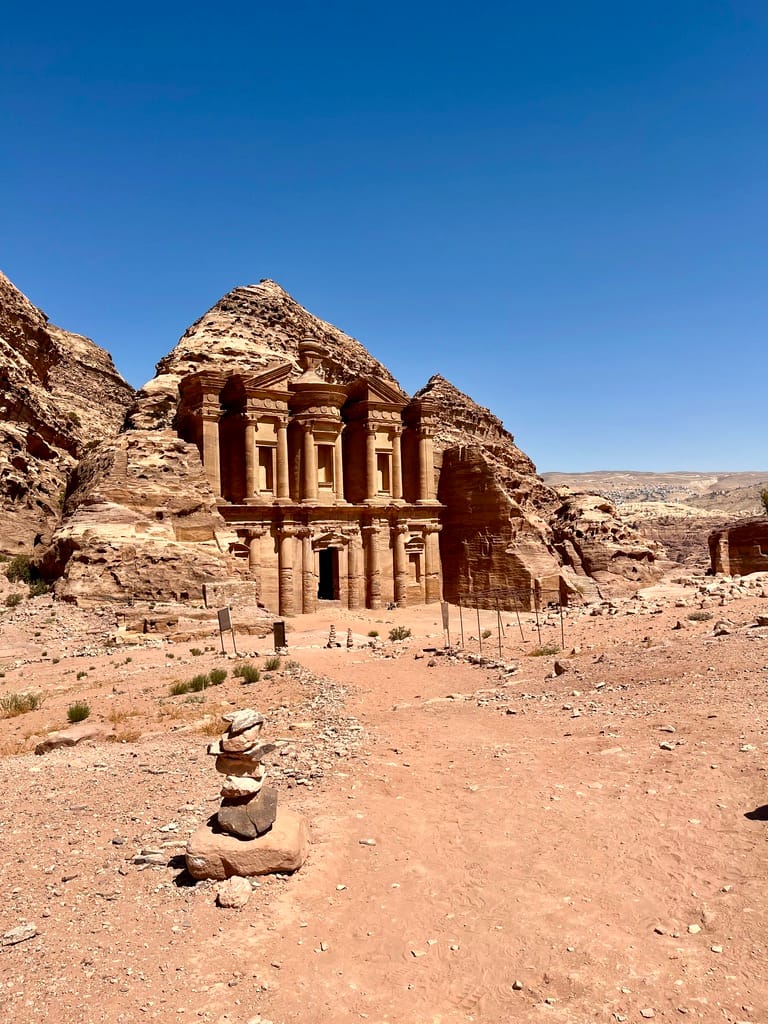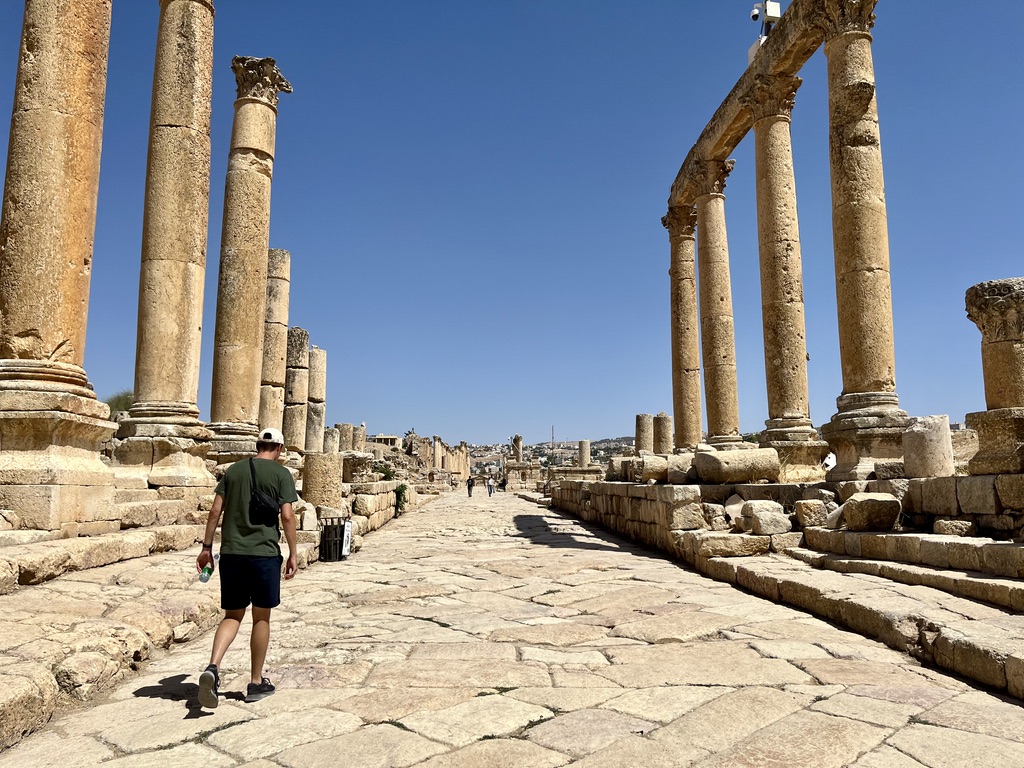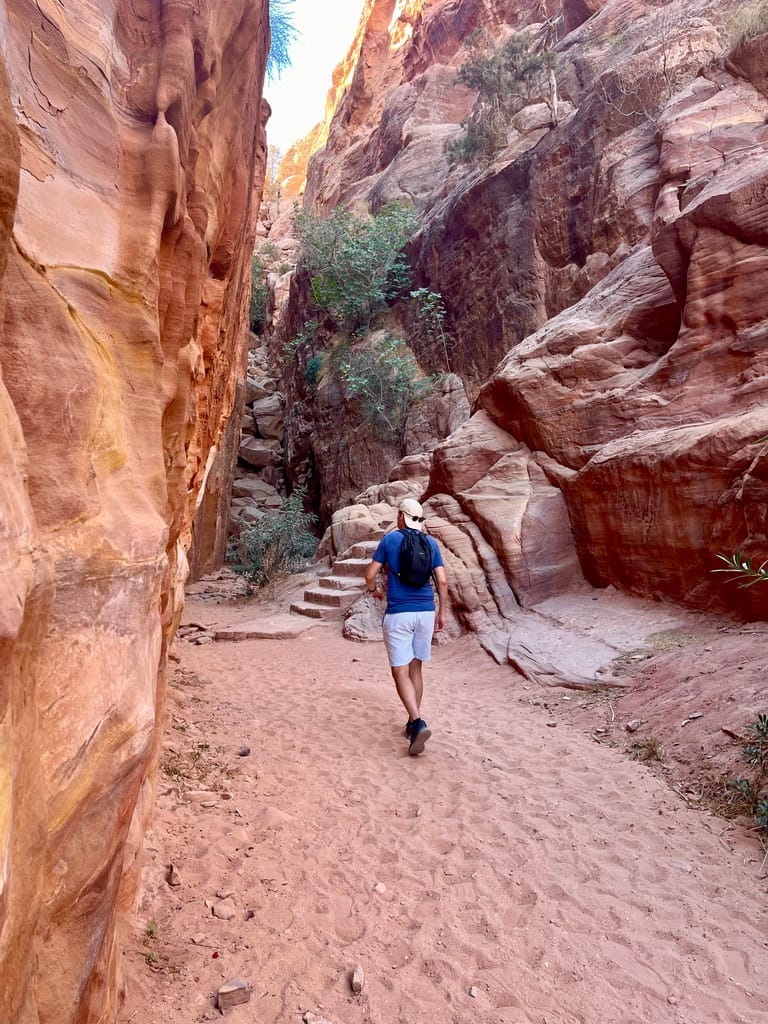Jordan Travel Tips
Jordan Travel Tips: Essential Things to Know Before Your Trip
We traveled to Jordan in 2024, when the ongoing conflict in the Middle East was a major concern for both travelers and the global travel community. Since Jordan was my first destination in the region, I had plenty of questions before departure. Is Jordan a safe country? Will I understand the traffic rules? How do I dress appropriately to avoid unwanted attention? Are there any unwritten cultural norms I should know about?
If you’re wondering the same things, you’re in the right place. I’ve gathered my research and personal experiences into this guide to help you navigate Jordan with confidence. By the end, you’ll be well-prepared for your trip! And if you still have questions, I’ve written in-depth articles covering even more Jordan travel tips.
General Travel Advice for Jordan
Best Time to Visit Jordan
The best time to visit Jordan is during spring (March to May) and autumn (September to November) when temperatures are mild and dry—perfect for sightseeing and outdoor activities. Summers can be scorching, making long visits, like exploring Petra, exhausting during midday. Surprisingly, the desert isn’t always the hottest region. We found that the Dead Sea and Red Sea (Aqaba) areas were significantly warmer than the rest of the country.
If you’re visiting in winter, prepare for cold nights in the desert, with temperatures sometimes dropping below zero. Flash floods are also a risk, particularly in narrow canyons (siqs), which may lead to temporary closures of major sites like Petra or hiking trails.
Visa Requirements for Jordan
Most travelers need a visa to enter Jordan, which costs 40 JOD and is valid for 30 days. If eligible, you can get a visa on arrival at Queen Alia International Airport or Sheikh Hussein Bridge (if crossing from Israel). Another option is to apply online via Jordan’s e-visa system.
For travelers eligible for a visa on arrival (VoA) and staying at least two nights, the Jordan Pass is a great deal. It waives the visa fee and includes entry to many tourist attractions, such as Petra. Want to know more? Than my guide about the Jordan Pass is right up your ally.
Currency and Payments in Jordan
Jordan’s currency is the Jordanian Dinar (JOD or JD), which is pegged to the USD. While credit cards are widely accepted in cities, hotels, and tourist hubs like Amman, Petra (Wadi Musa), the Dead Sea, and Aqaba, rural areas often operate on a cash-only basis or charge extra for card payments.
ATM Fees & Cash Withdrawals:
- ATMs typically charge a 3.5–5 JOD fee per withdrawal for foreign cards.
- Most ATMs limit withdrawals to 250 JOD per transaction.
- If staying in rural areas, consider paying for accommodation via booking platforms to avoid hefty ATM fees.
Languages Spoken in Jordan
While Arabic is the official language, you’ll be happy to know that English is widely spoken, especially in tourist areas. Even road signs are in both Arabic and English, making navigation easier.
Do you want to learn some basic Arabic phrases to impress your hosts? Here are a few useful ones:
- Hello – مرحباً (Marhaban)
- Good morning – صباح الخير (Sabah al-khair)
- Good evening – مساء الخير (Masa’ al-khair)
- Thank you – شكراً (Shukran)
- You’re welcome – على الرحب والسعة (Ala al-rahb wa al-sa‘a) or simply عفواً(Afwan)
- Excuse me – عذراً (‘Udhran) or لو سمحت(Law samaht) (more polite)
- Goodbye – مع السلامة (Ma‘a as-salama)
- Can I get the bill? – الحساب من فضلك؟ (Al-hisab min fadlak?) (if speaking to a man) / الحساب من فضلكِ؟(Al-hisab min fadlik?) (if speaking to a woman)

What to Wear in Jordan: Dress Code for Travelers
As our departure date approached, I found myself stressing over what to pack and what was appropriate to wear in the Middle East. While Jordan is one of the more liberal countries in the region, Islam is the predominant religion, so dressing modestly is still a good idea to respect local customs. I scoured the internet for advice, but most articles left me more confused than informed. So here’s the rule of thumb:
- Cover your shoulders.
- Avoid tight-fitting (bodycon) clothes.
- Shorts should cover at least half of your upper leg (think hiking shorts). If they cover your knees: bonus points!
For comfort, flowy clothing in breathable fabrics like cotton and linen is your best bet. The weather varies throughout the day, so layering is key.
In touristy areas like Wadi Musa (Petra) and the Dead Sea, you can dress more casually without drawing attention—Western-style outfits are completely acceptable here. Want more detailed outfit advice? Check out my full guide on what to wear in Jordan!
Beach Destinations: What to Expect
What you feel comfortable wearing at the beach depends on you, but if you want to avoid unwanted stares from locals, I’d recommend skipping skimpy bikinis. A regular bikini or a one-piece swimsuit is usually fine. Private beaches are your best bet, as they tend to be more relaxed and hassle-free.
I heard from other travelers that public beaches can be uncomfortable, with male onlookers making them feel uneasy. Some also described them as filthy, so we decided to skip them altogether. The only public beach we visited was for diving in Aqaba, where we unknowingly used the male public showers fully clothed—and got scolded for it!
Essential Items to Pack for Jordan
If you only pack three essential things for your trip to Jordan, make them these:
✅ Sturdy shoes – A must for hiking and exploring sites like Petra.
✅ A hat – The sun can be brutal, and shade is often scarce.
✅ A backpack – Essential for carrying water and snacks during long visits.
(✅ For women: A scarf – Handy for covering up when needed, whether for religious sites or extra sun protection.)
Want to know what else you shouldn’t forget? Stay tuned for my ultimate Jordan packing list—coming soon!

Religion in Jordan: Respecting Local Customs
One of the remarkable things about Jordan is its religious diversity and peaceful coexistence. Over the years, many refugees from neighboring countries have settled in Jordan, creating a unique blend of cultures and traditions. This is reflected in everyday life—you’ll see women in Western clothing working alongside those wearing hijabs or even niqabs. Similarly, men wear a mix of Western-style outfits, traditional clothing, or even full white robes, particularly in the south near Saudi Arabia.
How Religion Affects Travelers
For most visitors, Islam’s influence on daily life won’t significantly impact their trip. However, as in any country with a dominant religion, certain customs align with Islamic traditions:
- Prayer is an integral part of daily life. In hotels and public buildings, you’ll often find stickers indicating the direction of Mecca or dedicated prayer rooms. The call to prayer echoes across cities and rural areas multiple times a day, adding a unique cultural touch to your experience.
- If you have a local guide, they may pause for a quick prayer during your tour—something that is usually done discreetly and without much disruption.
Alcohol in Jordan
Since alcohol is considered haram (forbidden) in Islam, its availability depends on the region:
- In rural areas, alcohol is often unavailable.
- In cities and tourist hubs, some restaurants and hotels serve alcohol, but not all have a liquor license.
- Where alcohol is available, expect high prices due to limited supply.
Traveling to Jordan During Ramadan
If you visit during Ramadan, the impact on your trip will be more noticeable. While we haven’t personally traveled to Jordan during this time, many travelers report:
✅ Tourist areas still have open restaurants, but eating or smoking in public is discouraged.
✅ Alcohol availability may be even more limited than usual.
✅ Bedouin guides in Wadi Rum remain available, as tourism is their main livelihood.
Despite these adjustments, many visitors describe traveling during Ramadan as an enriching and eye-opening experience. As long as you’re willing to respect local customs, there’s no reason to be concerned.

Alcohol in Jordan: Where and How to Drink
As mentioned earlier, the availability of alcohol in Jordan varies significantly depending on location. While you’ll find it in major cities like Amman and Aqaba, as well as in tourist hubs such as Wadi Musa (Petra) and the Dead Sea, it’s far less common in rural areas. Upscale hotels, high-end restaurants, and select bars are the most reliable places to find alcoholic beverages.
That said, drinking in public is not as widely accepted as in many Western countries. Unlike Europe, where enjoying a glass of wine outdoors is common, public drinking in Jordan is frowned upon. To avoid unwanted attention, it’s best to drink in designated areas and avoid being visibly intoxicated in public spaces.
Jordanian Beers and Wines: A Pleasant Surprise
To our surprise, Jordan has its own locally brewed beers and wines! The most widely available is Petra Beer, a strong lager often found in restaurants and hotels that serve alcohol. But perhaps the biggest hidden gem is Jordanian wine.
During our trip, we visited JR The Wine Experience in Amman, a tasting venue by JR Wines, one of Jordan’s few wineries. They cultivate grapes in the basalt-rich soil of northern Jordan, producing an impressive selection of wines. The sommelier guided us through the winery’s fascinating history, which dates back to 1953, making for an unexpected yet delightful experience in the Middle East.
Driving in Jordan: What You Need to Know
Renting a car in Jordan is a great way to explore the country at your own pace, but there are a few key things to know before you hit the road.
Do You Need an International Driving Permit?
If you’re a European traveler, you might find conflicting information about whether an International Driving Permit (IDP) is required. Some sources say it’s unnecessary, while others insist on it. My advice? Get one. It’s inexpensive and can save you from potential issues. During our trip, we had to stop multiple times at police checkpoints, where officers always asked for our passport and driver’s license. If just one officer refuses to accept your non-IDP license, you could be in trouble. Better safe than sorry!
Car Rental & Insurance: What You Should Know
When renting a car in Jordan, pay close attention to insurance coverage. Driving conditions can be unpredictable, many cars are older, and road damage is common. Rather than purchasing insurance directly from the rental company, it’s often cheaper to use a third-party insurer. We personally recommend RentalCover.com, which has provided us with reliable and affordable coverage in multiple countries.
What It’s Like to Drive in Jordan
Driving on Jordan’s highways is mostly manageable for those experienced in driving abroad. However, city driving and local roads can be chaotic. Here’s what you need to prepare for:
- Honking is constant – often used as a way to communicate rather than out of frustration.
- Traffic rules can feel vague – a two-lane road can suddenly turn into four, depending on the time of day.
- Speed bumps are everywhere – and not always well-marked! Be cautious, especially at night.
- Watch for pedestrians and animals – people and livestock often cross highways unexpectedly.
Want to be fully prepared? I’ve compiled a detailed guide on driving in Jordan, covering road conditions, local driving habits, and other Jordan travel tips to help you navigate smoothly.

Arab Hospitality: Cultural Etiquette & Social Norms
One of the most valuable Jordan travel tips is to embrace the warmth and generosity of the locals. Jordanians take hospitality seriously, and understanding a few cultural norms can help you navigate social interactions with confidence.
Expect Overwhelming Kindness
From the moment we arrived, locals constantly approached us—offering help, asking if we needed directions, or simply welcoming us to their country. At first, we felt uneasy, wondering if it was a scam, but we quickly realized that this level of kindness is completely normal in Jordan.
Yes, some taxi drivers or guides may hope to offer their services, but more often than not, Jordanians genuinely want visitors to feel welcome. Compared to other tourist destinations, we rarely felt pressured or harassed, making it one of the most pleasant travel experiences we’ve had.
Greeting Etiquette: What to Do
- Stick to verbal greetings unless a hand is offered to you.
- Men and women who don’t know each other well usually don’t shake hands. Instead, a nod and a smile show respect.
- Conservative Bedouin women may avoid direct physical contact with men, so don’t take it personally if they decline a handshake or a photo.
Food & Hospitality: A Core Part of Jordanian Culture
One of the best Jordan travel tips is to embrace the local way of dining. Sharing food and tea is a big deal in Jordan, and if a local invites you into their home, consider it an honor. Here’s what you need to know:
- Remove your shoes before entering.
- Bring a small gift—cookies or sweets are always a great choice.
- Expect to eat from shared dishes—many meals involve eating directly from a communal plate.
- Use your right hand to eat, as the left hand is traditionally considered unclean.
Understanding these cultural norms will enhance your trip and deepen your appreciation of Jordanian hospitality.

Safety & Health Tips for Travelers
When planning a trip, safety and health should always be a priority. Jordan is one of the safest countries in the Middle East, but like any destination, staying aware of your surroundings and taking a few precautions will make your journey smoother. Here are some essential Jordan travel tips to help you stay safe and healthy on the road.
Is Jordan Safe for Travelers?
Absolutely! Violent crime is rare, and Jordanians are welcoming and protective of tourists. Even though there was war in Israel when we were there we never felt uneasy. That said, petty theft can happen in crowded places, so always keep your valuables secure. The biggest safety concerns usually involve traffic (Jordanian driving can be chaotic) and scams targeting tourists, particularly in popular areas like Petra and Wadi Rum.
🚗 Traffic & Driving Hazards
- Pedestrians don’t have the right of way, so always check before crossing.
- Expect aggressive driving, unexpected lane changes, and minimal use of turn signals.
- If renting a car, always get full insurance—accidents happen more often than you’d expect.
💸 Tourist Scams
- Overpricing in taxis is common. Always negotiate the fare or insist on the meter before starting a ride. We used Uber in Amman which was very convenient.
- In tourist hotspots, some “guides” may offer free help and later demand payment. Politely decline if you’re not interested.
- Shops near major attractions often inflate prices—compare costs before buying souvenirs.
Health Tips: How to Stay in Top Shape in Jordan
🌡️ Dealing with the Heat
Jordan’s sun is no joke! Dehydration and heatstroke can hit fast, especially when exploring Petra or Wadi Rum.
✔️ Drink plenty of water—carry a refillable bottle and top up whenever possible.
✔️ Wear a hat, sunglasses, and sunscreen—the sun here burns stronger than in Europe.
✔️ Take breaks in the shade, especially between 12 PM and 3 PM.
💧 Can You Drink Tap Water?
Tap water in Jordan is technically safe in cities, but it doesn’t always taste great and might upset your stomach if you’re not used to it. To stay safe:
- Drink bottled or filtered water.
- Avoid ice cubes unless you’re sure they’re made from purified water.
- Use bottled water for brushing your teeth, just to be cautious.
🥘 Food Safety & Eating Out
Jordanian food is incredible, but street food hygiene can vary. To avoid stomach troubles:
- Eat at busy places with high turnover (fresh food = less risk).
- Stick to cooked foods instead of raw salads, especially in smaller towns.
- Wash or peel fruits before eating.
🏥 Do You Need Vaccinations?
For most travelers, routine vaccines (Hepatitis A, Typhoid) are recommended. Rabies isn’t a major risk, but if you plan on hiking or spending time with animals, consider getting vaccinated.
🔴 Emergency Numbers & Pharmacies
Jordan has modern healthcare facilities, especially in Amman and Aqaba. In case of an emergency, dial 911. Pharmacies are everywhere, and many over-the-counter medications (painkillers, stomach relief) are available without a prescription.
The end of my Jordan Travel Tips: Final Thoughts
Jordan offers an unforgettable mix of history, adventure, and warm hospitality. With the right preparation, your trip will be smooth and stress-free. Respect local customs, pack smart, and stay aware of your surroundings. Driving can be chaotic, but exploring on your own is rewarding. The food is incredible, and staying hydrated will help you handle the heat. These Jordan travel tips will help you make the most of your visit. Whether you’re hiking in Petra, floating in the Dead Sea, or diving in Aqaba, Jordan will leave you wanting more!
